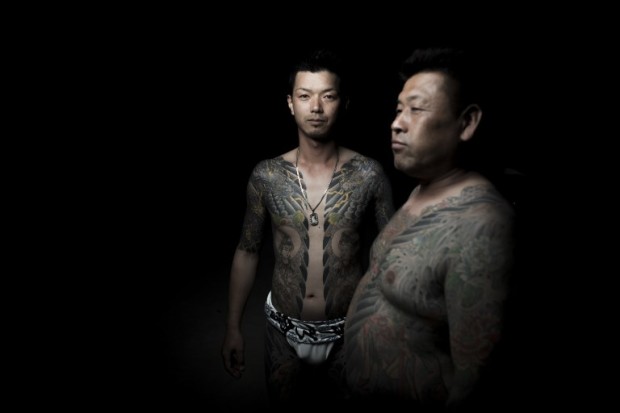
In this picture taken on May 20, 2017, men pose for photographs showing their “Irezumi” Japanese traditional tattoos related to the Yakuza’s universe, during the Sanja Matsuri festival in Tokyo. Over 1.5 million people flocked to Tokyo’s Asakusa district during the three-day annual festival, which heralds the coming of summer in the Japanese capital. AFP
TOKYO, Japan — Life as a Japanese “yakuza” mobster is getting so hard that some are resorting to shoplifting food to stay in business.
Two members of an organized crime gang were arrested for allegedly trying to steal grocery items worth 76,120 yen ($683) at a mall in the central Japanese city of Nagoya, police told AFP on Wednesday.
“They are members of an affiliated gang group of the Kobe Yamaguchi-gumi,” a police spokesman said, referring to an organization that split off from the country’s biggest yakuza crime syndicate, Yamaguchi-gumi, in 2015.
The gangsters, aged 52 and 59, reportedly tried to steal 198 items including a watermelon, rice, eel, and prepared dishes, in the company of their gang boss, the Asahi and Mainichi dailies reported.
One of the men told police that “the group is so poor” members have to steal food, the Mainichi said.
Japan’s yakuza blossomed from the chaos of post-war Japan into multi-billion-dollar criminal organizations involved in everything from gambling, drugs and prostitution to loan sharking, protection rackets and white-collar crime.
They were long tolerated as a necessary evil for ensuring order on the streets and getting things done quickly — however dubious the means.
Unlike the Italian Mafia or Chinese triads in other countries, yakuza have long occupied a peculiar grey area in Japanese society — they are not illegal and each group has its own headquarters in full view of police.
But waning social tolerance, a weak economy and steadily falling memberships have hurt their bottom line.
Stiffer anti-gang regulations are also making life a struggle as regular businesses are banned from dealing with mobsters, who struggle to even open a bank account or receive mail at their office.
Such factors have been cited as contributing to the high-profile split of the Yamaguchi-gumi. CBB